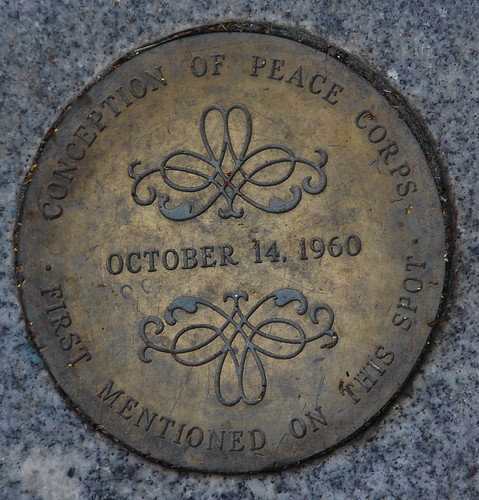Gaining Work Experience in Tough Economic Times – Four Alternatives to the Traditional Workforce
The collapsing economy means that job prospects for this year’s college graduates are more competitive than at any previous time in our nation’s history. In these extraordinarily difficult times, members of the Class of 2009 are truly struggling to find meaningful entry-level employment options.
In addition, with many expecting the tough times to linger, members of the Class of 2010 may also want to begin thinking about one of these alternative paths. While often seen as unusual choices in other years, these four alternatives to the traditional workforce could be just the ticket for those having difficulty securing an entry-level position.
The AmeriCorps
One consideration for upcoming graduates is the AmeriCorps. In fact, if you have spent time being of service to others then you know just how rewarding community service type programs can be.
The program clearly focuses on a way of life that involves a commitment to others for a lifetime. In fact, as part of the AmeriCorps Pledge, participants are expected to not only pledge their support for the upcoming year but in the years ahead.
 In the Corps, there is a wide range of potential ways to serve. The application process begins with interested applicants filling out a form that focuses on their personal areas of interest. The second aspect offers applicants a chance to consider the specific location they wish to service.
In the Corps, there is a wide range of potential ways to serve. The application process begins with interested applicants filling out a form that focuses on their personal areas of interest. The second aspect offers applicants a chance to consider the specific location they wish to service.
The program offers more than 75,000 opportunities for “adults of all ages and backgrounds to serve through a network of partnerships with local and national nonprofit groups.” AmeriCorps provides individuals the opportunity to apply their skills and ideals with an eye towards meeting critical community needs.
Whether it be to tutor and mentor disadvantaged youth, improve health services or build affordable housing, the Americorps offers a wealth of opportunities that will help graduates gain valuable work experience.
One of the critical benefits of full-time members is a Segal AmeriCorps Education Award of $4,725. This sum may be used to pay for college, graduate school, or to pay back qualified student loans. Part-time corps’ members may receive a partial Award. In some cases, AmeriCorps members may also earn a small living allowance during the period that they provide their services.
In addition, the program offers qualified student loan forbearance. While interest continues to accrue on your loans during this period of forbearance, successful completion of your term of service can result in the payment of all or a portion of the interest that has accrued on qualified student loans during the service period.
AmeriCorps is made up of three main programs. The AmeriCorps State and National Program supports a broad range of local intensive service programs to meet critical community needs. For those interested in supporting organizations and public agencies to create and expand programs that build capacity and ultimately bring low-income individuals and communities out of poverty, there is the AmeriCorps VISTA program. And finally, the AmeriCorps NCCC (National Civilian Community Corps), a full-time residential program for men and women, ages 18-24, that seeks to strengthen communities while developing leadership traits.
While it is getting late for the Class of 2009, interested applicants may still find some limited opportunities available.
The Peace Corps
One of the oldest service programs, the Peace Corps began in 1960 with John F. Kennedy’s calls to service. As opposed to the Americorps focus on our own country, the Peace Corps is designed around the establishment of world peace through living and working in less-developed countries.
Today, the number of volunteers is nearing 200,000. Working on such important matters as AIDS education, information technology and the protection of the environment, those volunteers have served in 139 different countries. Ultimately, Peace Corps Volunteers “continue to help countless individuals who want to build a better life for themselves, their children, and their communities.”
 As with the AmeriCorps, the Peace Corps offers tangible benefits beyond those of skill development and the feeling of satisfaction that comes with helping others in need. Corps volunteers receive pay and living expenses, some vacation time, and transportation to and from the country of service. In addition, they also receive student loan deferment.
As with the AmeriCorps, the Peace Corps offers tangible benefits beyond those of skill development and the feeling of satisfaction that comes with helping others in need. Corps volunteers receive pay and living expenses, some vacation time, and transportation to and from the country of service. In addition, they also receive student loan deferment.
Those interested will also find a great array of potential service opportunities with each area offering many different options for duties and responsibilities. There are truly possibilities for every graduate irrespective of college major.
Peace Corps Volunteers work in the following areas: education, youth outreach, and community development; business development; agriculture and environment; health and HIV/AIDS; and information technology.
Perhaps the best aspect is that the Peace Corps accepts applications on a rolling basis. Therefore, there are still plenty of opportunities for 2009 grads to consider.
Teach for America
One of the most popular and competitive options is Teach for America. Program spots are limited and the number of applications has been going up every year, but the financial benefits of the program are significantly higher than either the aforementioned AmeriCorps or Peace Corps positions.
The program also features essentially only one option, teaching. The goal of the program is to bring the nation’s best and brightest to the classroom in an effort to end educational inequity.
 Teach For America is currently a member of the AmeriCorps programs and therefore currently offers corps members who have not served previously as AmeriCorps members the traditional benefits of loan forbearance (the postponement of loan payments) and an education award of $4,725 at the end of each year of service (a potential of $9,450 over the two years), that may be used for future educational expenses or towards the repayment of qualified student loans.
Teach For America is currently a member of the AmeriCorps programs and therefore currently offers corps members who have not served previously as AmeriCorps members the traditional benefits of loan forbearance (the postponement of loan payments) and an education award of $4,725 at the end of each year of service (a potential of $9,450 over the two years), that may be used for future educational expenses or towards the repayment of qualified student loans.
In addition, Teach for America Corps members receive the same salaries and health benefits as other beginning teachers. Corps members teaching in urban sites can effectively see starting salaries of anywhere from $30,000 to a high of $47,000 while those placed in a rural area would typically earn somewhere between $27,000 and $45,000. These salaries are also dependent on degree qualifications with the higher sums available only to those who have earned a graduate degree.
New applications for the 2009 fall year are now closed but those interested in the program will soon be able to pursue opportunities for 2010.
Graduate School
One of the fall back positions for undergraduates has always been graduate school. Entry allows students loan forbearance, a critical development for those unable to secure meaningful employment.
Adding to the luster of graduate school options, several schools have responded to the current situation facing graduates. For example in the northeast, Worcester Polytechnic Institute and Northeastern University are offering significant tuition discounts for master’s degrees programs to both this year’s graduates as well as new alumni.
 What can make the graduate school option even more viable is to obtain an graduate level assistantship. Among the various options are Teaching Assistants (TAs), Research Assistants (RAs) and Service Assistants (SAs). Each may offer pay and/or tuition-room and board adjustments in return for your services.
What can make the graduate school option even more viable is to obtain an graduate level assistantship. Among the various options are Teaching Assistants (TAs), Research Assistants (RAs) and Service Assistants (SAs). Each may offer pay and/or tuition-room and board adjustments in return for your services.
One truly great option is a program that features a partnership between the Peace Corps and a number of colleges and universities across the US. The partnership offers master’s degree level academic credit at more than 50 colleges and universities as well as financial incentives for Peace Corps service.
In addition, another Fellows/USA program offers scholarships or reduced tuition at more than 40 participating schools. Ultimately, the Peace Corps partnership program offers students the best of two worlds, viable and personally rewarding service experiences and the foundation of a meaningful graduate program.
Think Ahead
The exceedingly difficult job market certainly may have managed to sneak up on the Class of 2009. Though your opportunities are far more limited at this time, if you are struggling to find an entry-level position you should be sure to exhaust each of these service/study areas as well.
And if you are about to graduate in December of 2009 or the spring of 2010, you would definitely do yourself a great disservice by not examining the opportunities that may be available through these options.
Flickr photos courtesy of Sare-Bear, afagen, Monkey & Tree and Old Tasty.


Great article! I’ll send students from my blog here to read your suggestion.
Judy Anne Cavey
Work Experience Educator